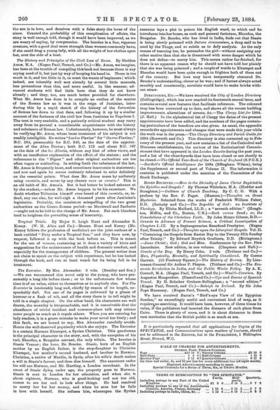The History and Principles of the Civil Law of Rome.
By Sheldon Amoco, MA. (Kagan Paul, Trench, and Co.)—Mr. Amos, we imagine, has been at the trouble of compiling this book not because there is any crying need of it, but just by way of keeping his hand in. There is too much in it, and too little in it, to meet the wants of beginners which, indeed, are tolerably well met already by several little manuals, less pretentious than this, and more useful. In like manner, ad- vanced students will find little here that they do not know already ; and they, too, are much better provided for elsewhere. What Mr. Amos has done is to compile an outline of the matter of the Roman law as it was in the reign of Justinian, intro- ducing this by a rapid sketch of the history of the formation of Roman law down to that date, and. following it up by a similar account of the fortunes of the civil law from Justinian to Napoleon I. - The text is very readable, and a patiently critical student may carry away from its perusal a considerable acquaintance with the history and substance of Roman law. Unfortunately, however, he mast always be verifying Mr. Amos, whose loose treatment of his subject is not readily intelligible. He writes "Lucke Flavius" for " Gnanzs Flavins ;" B.C. 264, presumably for B.C. 246, as the date of the appoint- ment of the Alien Pnetor ; both B.C. 172 and about B.C. ]67 as the date of the /ex Zbutia, without any hint of other views, and with an insufficient explanation of the effect of the statute; and the references to the " Digest " and other original authorities are too often vague or misleading. In setting forth the substance of the law, Mr. Amos is frequently loose, and sometimes inaccurate in statement; and now and again he seems curiously reluctant to seize definitely on the essential points. What does Mr. Amos mean by uniformly using curatela, and never by any chance cure or curatw ? This is an old habit of Mr. Amos's. But it had better be looked askance at by the student,—unless Mr. Amos happen to be his examiner. We doubt whether Tribonian himself ever heard of this curatela, or, in- deed, any one else, for well-nigh a thousand years after Justinian's legislation. Probably, the consistent misspelling of the two great authorities on the Grceco-Roman period—as Montrenil and Zacharia —ought not to be laid to the charge of Mr. Amos. But such blunders tend to heighten the prevailing sense of insecurity.


































 Previous page
Previous page